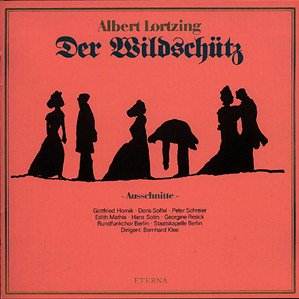Premiered on New Year’s Eve 1842, this delightful
work has long been a regular in the repertoire of German opera
houses, although rarely getting an airing elsewhere. Its convoluted
plot involves an elderly schoolmaster, Baculus, who goes poaching,
his young fiancée, and members of the local aristocracy.
Cross-dressing and mistaken identity make for a frivolous and
light-hearted mélange that, unlike most operas, has a happy
ending. Given its popularity in Germany and its lengthy spoken
dialogue in that language, it is no surprise that the two versions
that have dominated the catalogue emanated from that country.
The 1963 EMI Electrola issue featured the delightful, but light,
Anneliese Rothenberger and the beautifully toned Fritz Wunderlich
as the Baron, the whole rather lacking the vivacity found on the
set, first issued by DG in 1984, from which these excerpts are
derived.
Despite the ADD designation the recording quality
is first rate with voices and orchestra well balanced in an open
airy acoustic. Whilst Schreier as the Baron hasn’t the heady tonal
beauty of Wunderlich on the EMI, his voice is firm toned and well
tuned. He certainly characterizes well (tr.11). As the Count,
Gottfried Hornik, a renowned Papageno, is light voiced and even
toned (trs.12-13). Edith Mathis is ideal in vocal weight and palette
in her aria (tr.2) and ‘rides’ the orchestra well. However, it
is the ensembles that dominate both the opera and this selection.
I note how well the voices blend and carry the plot along under
Klee’s idiomatic and vibrant phrasing and tempi (trs.5-9).
This excerpts disc is a delightful representation
of a work little known outside Germany. It derives from the best
recording and performance issued. It is thoroughly recommended
to any opera lover who doesn’t know the work. Those who do will,
I suspect, already have the complete performance, dialogue and
all.
Robert J Farr
